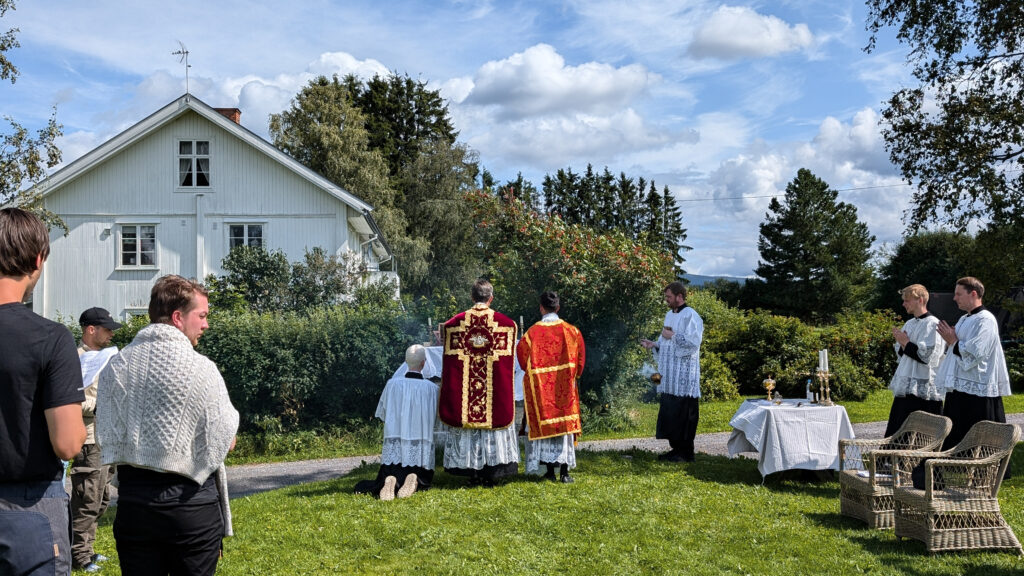In summary: Marriage is a contract that can only be valid if freely contracted by the parties concerned. Violence inflicted on one of the intending spouses renders it null and void. Whoever is aware of this, cannot still behave as a bachelor, because every marriage is celebrated publicly and, consequently, must be declared null and void publicly (when in fact it is null and void). Marriage is of interest to the whole of society, since it constitutes the family, which is the mother-cell of civil and ecclesiastical society. Secret marriage is not considered valid by Ecclesiastical Law.
* * *
The PR Editor received the following question:
“Here is the question: A man married against his will because he was deceived. His wife faked a pregnancy and when he found out, he wanted to end the relationship, so she blackmailed him, making an attempt on his life, so he was forced to marry. If he then has an extramarital relationship, is he in adultery? Since this marriage is null and void”.
Our answer will comprise three steps:
1. Under pressure
The marriage in question, if celebrated in the Church, is likely to have been null. In effect, marriage is produced by the consent of the spouses, but consent is an act of the will, which is an essentially free faculty. To consent by force is not to consent. For this reason canon 1103 reads:
“A marriage contracted by violence or by grave fear arising from an external cause, even if not directed to extort consent, is invalid when to rid oneself of it, one is forced to contract the marriage.”
Commenting on the canon, we see that a marriage produced by violence or fear is null and void, provided that the following conditions are met:
1) the evil that the person fears, if he does not accept the marriage, must be grave;
2) the fear must be instilled by an external cause (threat of death, denunciation, revenge…). It must not be a mere figment of the imagination or sensibility of the person marrying. It is not necessary that the fear or violence be aimed directly at the matrimonial consent, but it is enough that the engaged couple, pressured or placed in an embarrassing situation not explicitly related to the marriage, believe they have no other choice but to get married.
Although a marriage contracted under pressure is null and void, one who has so married cannot behave as a bachelor until the nullity has been publicly declared by the competent authority, as will be discussed below.
2. Process for the Declaration of Nullity
It is not the Church’s role to annul a marriage validly contracted and carnally consummated. However, she can – and even must – declare null and void a marriage which, although apparently valid, was null and void due to the existence of a limiting or decisive impediment. The marriage celebrated under pressure falls under this clause. It must be taken to the Ecclesiastical Court, so that, after due investigations, it is finally declared null and void. Before the declaration of nullity, it is not permissible for the “spouses” to behave as unmarried people, because just as the marriage is publicly celebrated, so it must also be publicly declared null. The reason for this is that marriage is of interest to society, since it constitutes the mother-cell of civil and ecclesiastical society; it founds the domestic church. Therefore, society has to be notified, so that it can recognize a valid remarriage after an invalid first “marriage”.
Two objections are raised, however:
2.1. “A legal process is expensive!”
By the way there is a lot of misinformation or even misconceptions.
It is understandable that such a process entails expenses, since it supposes sessions in which the interested parties, the witnesses, the experts… are heard; the officers of the Court are paid. However, the Courts of the Church do not depend entirely on the fees they receive. The administration of justice is a duty of the Church towards all, rich and poor. Therefore, if there are fees, they are adapted to the conditions of the parties involved. In this regard, Fr. Jesus Hortal S.J. writes
“There is no table, nationwide, in Brazil for ecclesiastical courts. Some charge practically nothing. In others, the majority, the costs for a process of declaration of nullity are between one and four minimum wages. These are fees that do not cover the real expenses, with all the interrogation sessions of the parties, the witnesses, the experts, etc. In reality, the dioceses contribute to cover the rest. It is true that they are left aside, the lawyers’ fees. But, in general, these are people who work in this field more for love of the Church than for anything else. So, if you compare it to the civil processes of legal separation or divorce, what they charge is very little.
On the other hand, don’t forget: if you cannot pay even the fees set by the court, don’t give up. You are entitled to justice. Ask for full or partial poverty benefit, according to your economic condition. Your parish priest can give you the corresponding certificate. Present it at the court office when you file your claim or petition. If you really need this benefit, don’t be ashamed to ask for it” (Marriages which should never have existed, pp. 57ff).
2.2. “It’s been so long! Is it still worth it?”
The Civil Law stipulates a time limit for pleading for the annulment of a marriage; after the time limit has passed, it is no longer possible to go to court to obtain an annulment. One might think that in the Church, too, there is a time limit for requesting a declaration of nullity. But this is not the case, because a declaration of nullity is not an annulment; it is the verification that such and such a marriage was never valid; it does not become valid with the passage of time, so that at any time, even after decades of common life, the parties concerned can ask a Court to order an investigation to find out whether there was not a limiting impediment in the act of contracting the marriage.
It is clear that digging into the past to discover a possible matrimonial impediment can be uncomfortable and painful; however, it is necessary for the good of the parties concerned. Fr. Jesus Hortal writes:
“What is asked for is the declaration of nullity, not annulment. That is to say, these are cases where there has never been a marriage. So, it doesn’t matter if more or less time has passed. What produces the marriage is not time, but the consent of the legally capable parties, legitimately manifested. Therefore, it does not matter if only one day has passed or if twenty years have passed; if these elements are missing, the marriage is still null and void” (op. cit., p. 58).
3. Adultery?
Would adultery be the extra-marital relationship of one who is married under pressure and has not yet obtained a declaration of nullity?
We answer:
a) on a legal level, it would be adultery, because as long as the nullity has not been publicly declared, the person is considered to be married. In the external forum, the validity of the marriage is presumed until the contrary is manifested. The presumption is always in favor of validity, according to the legal axiom: “Melior est conditio possidentis. – The condition of the possessor is better”, that is, the status quo is presumed to be legitimate until the respective illegitimacy is demonstrated;
b) on the moral level, it would be an extra-marital relationship, which can never be legitimate. In fact, to love is to desire the good of the other; it implies giving or surrendering, so that the good of the beloved may be attained. Now, only in a validly constituted marriage does the full and committed union between the spouses occur; only then does the adequate environment exist for sexual relations, which presuppose a home and stable love between husband and wife, so that they can educate their children.
In other words: sexual intercourse is something so intimate and deep that it cannot be the first demonstration of the nascent love; rather, it is the supreme expression of the maturation and consolidation of this love. To unite sexually means to give oneself completely, and therefore to commit oneself totally. Whoever separates sexuality from committed love seeks only the selfish pleasure attached to sexual relations; this pleasure is not the purpose of sexuality, but is something the Creator added to sexual life to facilitate the performance of its unitive and fruitful function. The relationship between sexuality and love can be described as follows
(a) Prostitution: is the relationship between “anonymous” people, who often have no mutual love;
b) Free love: is the relationship between people who know and love each other mutually, but without commitment or definitively assuming their consortium;
c) Engagement: is love, already in a certain way committed, but still with reservations, with each person being able to withdraw;
d) Marriage: committed and lasting love, a climate suitable for sexual donation, while in the three previous cases this is inappropriate.
This is what we thought of saying in response to the missivist friend.
Source (Ask and Answer magazine, 463/2000)




